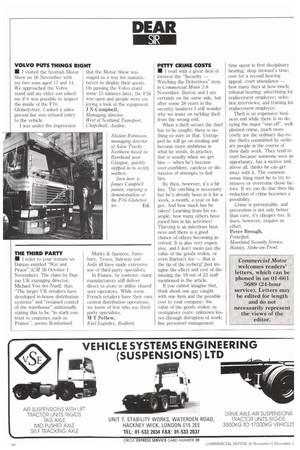DEAR
Page 66

If you've noticed an error in this article please click here to report it so we can fix it.
SIR
• visited the Scottish Motor Show on 16 November with my two sons aged 17 and 14. We approached the Volvo stand and my elder son asked me if it was possible to inspect the inside of the F16 Globetrotter. I asked a salesperson but was refused entry to the vehicle.
I was under the impression • I refer to your feature on Danzas entitled "War and Peace" (CM 26 October-1 November). The claim by Danzas UK managing director, Michael Von der Nuell, that: "The larger UK retailers have developed in-house distribution systems" and "retained control of the warehouse" additionally stating this to be "in stark contrast to countries such as France", seems ill-informed. that the Motor Show was staged as a way for manufacturers to display their goods. On passing the Volvo stand some 15 minutes later, the F16 was open and people were enjoying a look at the equipment. J N Campbell, Managing director, West of Scotland Transport, Chapelhall, Airdrie.
Alistair Robinson, managing director of Ailsa Trucks Northern based in Barrhead near Glasgow, quickly stepped in to rectify matters.
Seen here is James Campbell junior, enjoying a demonstration of the FI6 Globetrot ter. Ed.
Marks & Spencer, Sainsbury, Tesco, Safeway and Asda all have made extensive use of third-party specialists.
In France, by contrast, many manufacturers still deliver direct to store or utilise shared user operators. While some French retailers have their own central distribution operations, we know of few who use thirdparty specialists.
M T Pellew, Exel Logistics, Bedford. PETTY CRIME COSTS • I read with a great deal of interest the "Security — Watching the Detectives" item in Commercial Motor 2-8 November. Burton and I are certainly on the same side, but after some 38 years in the security business I still wonder why we insist on tackling theft from the wrong end.
When a theft occurs the thief has to be caught; there is nothing so sure as that. Untrapped he will go on stealing and become more ambitious in what he steals. In practice, that is usually when we get him — when he's become over-confident, careless or dismissive of attempts to find By then, however, it's a bit late. The catching is necessary but he's already been at it for a week, a month, a year or longer. And how much has he taken? Learning from his example, how many others have joined him in his activities? Thieving is an infectious business and there is a good chance of others becoming involved. It is also very expensive, and I don't mean just the value of the goods stolen, or even Burton's fee — that is the tip of the iceberg! Just imagine the effect and cost of dismissing the 19 out of 23 staff mentioned in the article.
If you cannot imagine that, think about one guy caught with one item and the possible cost to your company: the value of the goods stolen; investigators costs; unknown losses through disruption of work; line personnel management time spent in first disciplinary hearing; shop steward's time; cost for a second hearing appeal; court attendance — how many days at how much; tribunal hearing; advertising for replacement employee; selection interviews; and training for replacement employee.
Theft is an expensive business and while there is no denying the major "one-off', wellplanned crime, much more costly are the ordinary day-today thefts committed by ordinary people in the course of their daily work. They tend to start because someone sees an opportunity, has a motive and, above all, thinks he can get away with it. The commonsense thing must be to try to remove or overcome those factors. If we can do that then the reduction of crime becomes a possibility.
Crime is preventable, and prevention is not only better than cure, it's cheaper too. It does, however, require an effort.
Peter Brough, Principal, Moorland Security Service, Hanley, Stoke-on-Trent.
















































































































